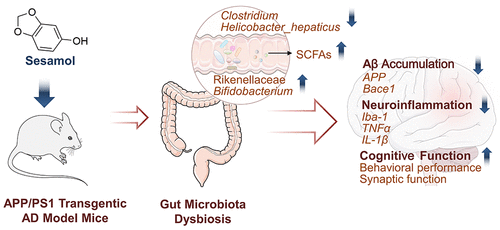当前位置:
X-MOL 学术
›
J. Agric. Food Chem.
›
论文详情
Our official English website, www.x-mol.net, welcomes your
feedback! (Note: you will need to create a separate account there.)
Sesamol Attenuates Amyloid Peptide Accumulation and Cognitive Deficits in APP/PS1 Mice: The Mediating Role of the Gut–Brain Axis
Journal of Agricultural and Food Chemistry ( IF 5.7 ) Pub Date : 2021-10-20 , DOI: 10.1021/acs.jafc.1c04687 Qing Liu 1, 2 , Tianzhi Xie 1 , Yujia Xi 1 , Ling Li 1 , Fengfeng Mo 2 , Xuebo Liu 1 , Zhigang Liu 1, 3 , Jin-Ming Gao 4 , Tian Yuan 3, 4
Journal of Agricultural and Food Chemistry ( IF 5.7 ) Pub Date : 2021-10-20 , DOI: 10.1021/acs.jafc.1c04687 Qing Liu 1, 2 , Tianzhi Xie 1 , Yujia Xi 1 , Ling Li 1 , Fengfeng Mo 2 , Xuebo Liu 1 , Zhigang Liu 1, 3 , Jin-Ming Gao 4 , Tian Yuan 3, 4
Affiliation

|
Alzheimer’s disease (AD), a neurodegenerative disease, is the leading cause of dementia. Sesamol is a lignan extracted from sesame oil and has been found to exert neuroprotective effects. The present study aimed to investigate the neuroprotective effects of sesamol on APPswe/PS1dE9 transgenic AD mice. The AD mice were fed with a diet supplemented with sesamol (0.075 w/w %). Sesamol treatment improved spatial memory and learning ability in AD mice, improved neuronal damage, and decreased Aβ accumulation. Sesamol protected the synaptic ultrastructure and inhibited neuroinflammatory responses in the brain of AD mice. Sesamol also significantly inhibited the overactivated microglia and reduced the overexpression of TNF-α and IL-1β in the brain of AD mice. Notably, sesamol reshaped gut microbiota by significantly decreasing the relative abundance of Helicobacter hepaticus, Clostridium, and Bacillaceae, enhancing the relative abundance of Rikenellaceae and Bifidobacterium in AD mice. It has been found that sesamol protected the gut barrier integrity and prevented the LPS leakage into the serum. Importantly, sesamol remarkably enhanced the content of SCFAs, including acetate, propionate, isobutyrate, butyrate, and valerate, in AD mice. Correlation analysis indicated that there was a strong correlation between the levels of SCFAs and cognitive functions. These results demonstrated that sesamol attenuated AD-related cognitive dysfunction and neuroinflammatory responses, which could be partly explained by its role in mediating the gut microbe–SCFA–brain axis. Thus, sesamol is a promising nutritional intervention strategy to prevent AD via the microbiota–gut–brain axis.
中文翻译:

芝麻酚减弱 APP/PS1 小鼠的淀粉样肽积累和认知缺陷:肠-脑轴的中介作用
阿尔茨海默病 (AD) 是一种神经退行性疾病,是导致痴呆的主要原因。芝麻酚是从芝麻油中提取的木脂素,已被发现具有神经保护作用。本研究旨在研究芝麻酚对 APPswe/PS1dE9 转基因 AD 小鼠的神经保护作用。用补充芝麻酚(0.075 w/w %)的饮食喂养AD小鼠。芝麻酚治疗改善了 AD 小鼠的空间记忆和学习能力,改善了神经元损伤,并减少了 Aβ 积累。芝麻酚保护突触超微结构并抑制 AD 小鼠大脑中的神经炎症反应。芝麻酚还可显着抑制 AD 小鼠脑中过度活化的小胶质细胞并降低 TNF-α 和 IL-1β 的过度表达。值得注意的是,芝麻酚通过显着降低肝螺杆菌、梭状芽孢杆菌和芽孢杆菌科,提高了理肯氏菌科和双歧杆菌的相对丰度在 AD 小鼠中。已经发现芝麻酚保护肠道屏障的完整性并防止 LPS 泄漏到血清中。重要的是,芝麻酚显着提高了 AD 小鼠中 SCFA 的含量,包括乙酸盐、丙酸盐、异丁酸盐、丁酸盐和戊酸盐。相关性分析表明SCFAs水平与认知功能之间存在很强的相关性。这些结果表明芝麻酚减弱了 AD 相关的认知功能障碍和神经炎症反应,这可以部分解释为它在介导肠道微生物-SCFA-脑轴中的作用。因此,芝麻酚是一种很有前景的营养干预策略,可通过微生物群-肠-脑轴预防 AD。
更新日期:2021-11-03
中文翻译:

芝麻酚减弱 APP/PS1 小鼠的淀粉样肽积累和认知缺陷:肠-脑轴的中介作用
阿尔茨海默病 (AD) 是一种神经退行性疾病,是导致痴呆的主要原因。芝麻酚是从芝麻油中提取的木脂素,已被发现具有神经保护作用。本研究旨在研究芝麻酚对 APPswe/PS1dE9 转基因 AD 小鼠的神经保护作用。用补充芝麻酚(0.075 w/w %)的饮食喂养AD小鼠。芝麻酚治疗改善了 AD 小鼠的空间记忆和学习能力,改善了神经元损伤,并减少了 Aβ 积累。芝麻酚保护突触超微结构并抑制 AD 小鼠大脑中的神经炎症反应。芝麻酚还可显着抑制 AD 小鼠脑中过度活化的小胶质细胞并降低 TNF-α 和 IL-1β 的过度表达。值得注意的是,芝麻酚通过显着降低肝螺杆菌、梭状芽孢杆菌和芽孢杆菌科,提高了理肯氏菌科和双歧杆菌的相对丰度在 AD 小鼠中。已经发现芝麻酚保护肠道屏障的完整性并防止 LPS 泄漏到血清中。重要的是,芝麻酚显着提高了 AD 小鼠中 SCFA 的含量,包括乙酸盐、丙酸盐、异丁酸盐、丁酸盐和戊酸盐。相关性分析表明SCFAs水平与认知功能之间存在很强的相关性。这些结果表明芝麻酚减弱了 AD 相关的认知功能障碍和神经炎症反应,这可以部分解释为它在介导肠道微生物-SCFA-脑轴中的作用。因此,芝麻酚是一种很有前景的营养干预策略,可通过微生物群-肠-脑轴预防 AD。











































 京公网安备 11010802027423号
京公网安备 11010802027423号